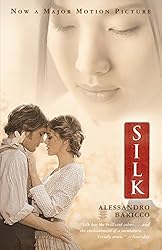Silk
144 pp.
ISBN-13: 9780307277978
Summary
This startling, sensual, hypnotically compelling novel tells a story of adventure, sexual enthrallment, and a love so powerful that it unhinges a man's life.
The year is 1861. Hervé Joncour is a French merchant of silkworms, who combs the known world for their gemlike eggs.
Then circumstances compel him to travel farther, beyond the edge of the known, to a country legendary for the quality of its silk and its hostility to foreigners: Japan.
There Joncour meets a woman. They do not touch; they do not even speak. And he cannot read the note she sends him until he has returned to his own country. But in the moment he does, Joncour is possessed. (.)
The 2007 film of the same name stars Michael Pitt and Keira Knightly.
Author Bio
• Birth—January 25, 1958
• Where—Turin, Italy
• Education—studied philosophy and piano
• Awards—Prix Medicis Etranger, 1995 (French literary prize
awarded to a non French author); Viareggio and Palazzo al
Bosco—both prestigious Italian literary awards.
• Currently—lives in Turin, Italy
Alessandro Baricco was born in Turin in 1958. He is the author of two previous novels, , which won the Prix Médicis in France and the Selezione Campiello prize in Italy, and , which won the Viareggio and Palazzo del Bosco prizes. He has also written essays in the field of musicology. Silk became an immediate bestseller in Italy and has been translated into twenty-seven languages. (From Barnes & Noble.)
More
Alessandro Baricco is a popular Italian writer, director, and performer, whose novels have been translated into a wide number of languages.
After receiving degrees in philosophy (under Gianni Vattimo) and piano, he published essays on music criticism: "Il genio in fuga" (1988) on Gioachino Rossini, and "L'anima di Hegel e le mucche del Wisconsin" ("Hegel's Soul and the Cows of Wisconsin", 1992) on the relation between music and modernity. He subsequently worked as musical critic forand , and hosted talk shows on Rai Tre.
Baricco debuted as a novelist with (translated as ) in 1991. In 1993 he co-founded a creative writing school in Turin, naming it Scuola Holden after J. D. Salinger's Holden Caulfield. The Scuola Holden hosts a variety of courses on narrative techniques including screenwriting, journalism, videogames, novels and short stories. In the following years his fame grew enormously throughout Europe, with his works topping the Italian and French best-seller lists. Larger recognition followed the adaptation of his theatrical monologue "Novecento" into the movie The Legend of 1900, directed by Academy Award-winning director Giuseppe Tornatore.
He has also worked with the French band Air, releasing "City Reading", a mix of the band's music with Baricco's reading of his novel City. (.)
Book Reviews
Silk has the brilliant colors...and the enchantment of a miniature.... Vividly erotic.
A riveting, lyrical love story, an accomplished historical fiction, a compact, condensed...epic about human hearts in crisis.
()
A heart-breaking love story.... A stylistic tour de force [and] a literary gem of bewitching power.
A book with language to savor.... It seems as guileless as a folk tale but propels a reader with real force.
In 1861, after plague has destroyed the silkworms in the Middle East and Africa, French merchant Herve Joncour travels to Japan, a country of which little is known to the French, in search of healthier, better silk. Flouting a Japanese law against exporting silkworms, Joncour leaves his loving wife for what will be the first of many four-month journeys through Europe, Russia and Siberia to Japan, where he befriends a wealthy Japanese trader and falls in love with his beautiful young mistress. With each trip, Joncour's expectations of closer contact with the young woman escalate, as does the danger of his journey. Joncour finally receives a letter from the concubine, which he must take for translation to a Japanese woman living in a neighboring French village The letter encourages Joncour to travel to Japan one last time; what he finds there will change his life forever. Baricco, winner of the Prix Medicis and other awards for his two previous novels, uses the precise, formal language of the 19th-century realists to evoke exotic settings, vivid characters and historical details. Written in 65 spare chapters (some less than a page long, some evolving into verse), Barrico's fairy tale of East and West weaves a fine, tight fabric of recurrent phrases and motifs, a novel as delicate and strong as its subject.
Discussion Questions
Use our LitLovers Book Club Resources; they can help with discussions for any book:
• How to Discuss a Book (helpful discussion tips)
• Generic Discussion Questions—Fiction and Nonfiction
• Read-Think-Talk (a guided reading chart)
Also consider these LitLovers talking points to help get a discussion started for :
1. Explore the underlying symbolism of the silkworms and metamorphosis—opening of the eggs, feeding, cocooning, and spinning 1,000 yards of thread.
2. The narrator describes Joncour as a man who witnesses his life rather than lives it. What is meant by that? How will that change during the story? Or will it?
3. ponders the sorrow of finding love in far off places and the difficulty of keeping desire alive in marriage. Talk about how this conflict gets played out in the novella—and in our own lives.
4. The book explores the difference between imaginary life and life lived day-to-day. Which is more real to Joncour?
5. Why does Joncour build the garden? What compensation does it offer him? What might the garden suggest about the larger role of art in our lives?
(.)


